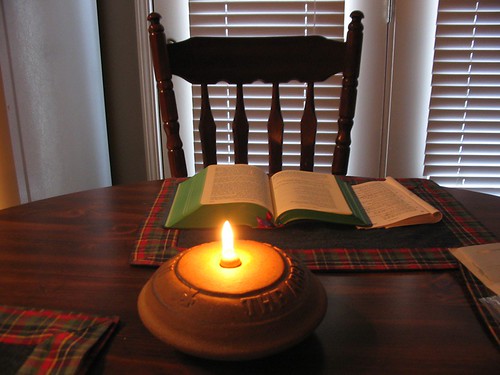 |
| Photo Credit: bhsher |
Lent is a forty day season of focused prayer, repentance and fasting that takes place each year before Easter, the Sunday that commemorates the resurrection of Jesus Christ. These forty days represent the time that Jesus spent in the wilderness immediately preceding the start of His public ministry. Christians around the world have celebrated this season for a number of centuries and many continue to do so to this day.
For those of us in the West, Lent begins on Ash Wednesday, the seventh Wednesday before Easter. On Ash Wednesday, worshipers -- most commonly, Catholics -- have ashes rubbed on their forehead in the shape of a cross. This is to represent "repentance" -- or the turning from self to God -- during the Lenten season. During the time of Lent, Christians are expected to fast. It could be fasting from food completely or just meat or, in recent years, some have chosen other items like candy, caffeine or even forms of technology, like television or the Internet. (Technically, Lent lasts more than 40 days since Sundays were originally a day when one could indulge in whatever was being denied since it is the Lord's Day, a day of celebration.)
The day before Ash Wednesday is known as Fat Tuesday or "Shrove" Tuesday (or in the French language, Mardi Gras). Carnivale (which means "away with meat") is an extended festival before Lent that is commonly found in Roman Catholic societies. These are times of celebration and feasting before the entrance into the fasting period. For 2025 the Lenten season began this week with Fat Tuesday taking place on March 4th and Ash Wednesday falling the following day, March 5th. Palm Sunday is April 13th and Easter Sunday falls on April 20th.
For those of us that are Protestant Christians, the observance of Ash Wednesday and Lent is usually dismissed since many regard those as Catholic holy days. But I think that all Christians can appropriately recognize this season. For a number of years, I have participated in the Lenten season and have found it beneficial. It can be a time of dedicated Bible study, prayer, some sort of fasting and repentance and can be great preparation in leading up to the remembrance of the most significant event in world history, the resurrection of Jesus of Nazareth.
Whatever you might choose to do or not do during this season, I trust that your focus will be on the One who loved us and gave Himself for us. Entering into a time of self-denial and focus on Jesus can help in leading us to a place of maturity where we are more committed to Him throughout the year, whether it is a designated holiday or not. May God bless you richly as we anticipate the celebration of His victory over sin and death.


